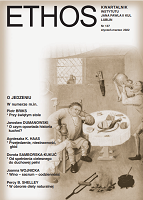O „STRAWIE DLA CIAŁA” W LITERACKIEJ PREZENTACJI JURODSTWA PROZA NIKOŁAJA LESKOWA I JEWGIENIJA WODOŁAZKINA
THE “FOOD FOR THE BODY” IN THE LITERARY IMAGES OF FOOLISHNESS FOR CHRIST, AS DESCRIBED BY NIKOLAI LESKOV AND EUGENE VODOLAZKIN
Author(s): Beata TrojanowskaSubject(s): Semiotics / Semiology, Customs / Folklore, Russian Literature, Culture and social structure , Theory of Literature, Sociology of Literature
Published by: Katolicki Uniwersytet Lubelski Jana Pawła II - Instytut Jana Pawła II, Wydział Filozofii
Keywords: holy fools; literary characters; food; Russian prose; Leskov; Vodolazkin;
Summary/Abstract: By referring to the prose of Nikolai Leskov and Eugene Vodolazkin, the article refl ects on the selected literary characters based on the model of sanctity displayed by ‘holy fools.’ The analysis focuses mainly on the motif of food, but also on the appearance of the protagonists. The author describes the transformation, which began in the 19th century, of the ‘fools for Christ’ type of sanctity, established in Russian literature. While Leskov develops his characters by combining features characteristic for that type of sanctity with elements of Russian folklore, Vodolazkin draws on the hagiographic literature, but also depicts emotions and experiences of the protagonists. The haptic descriptions of the process of their consuming food and places where they ate, as well as the scrutiny of the meaning food carried for them, indicate that both Leskov and Vodolazkin see not only a natural connection of food with carnality, but also its symbolic affi nity to the human spirit.
Journal: Ethos. Kwartalnik Instytutu Jana Pawła II KUL
- Issue Year: 35/2022
- Issue No: 1
- Page Range: 172-195
- Page Count: 24
- Language: Polish
- Content File-PDF

